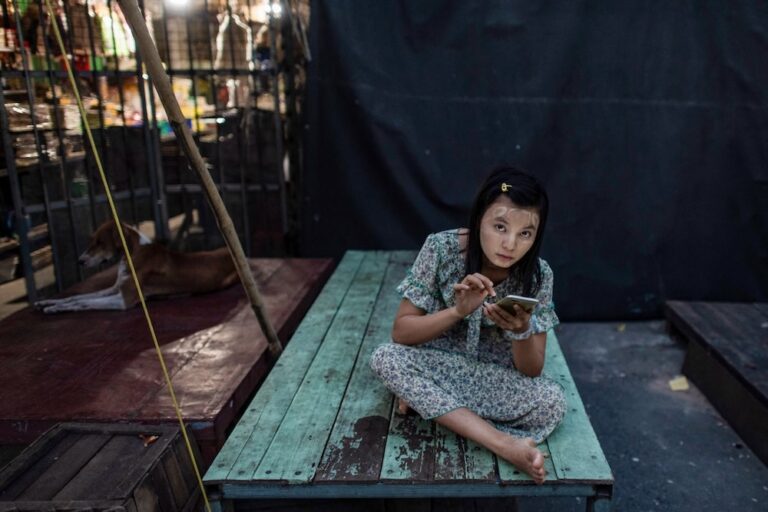“Amidst this violent crackdown, the international community urgently needs to show solidarity with the people of Myanmar as they struggle for their basic human rights. The muted response we’ve seen so far from the UN and ASEAN is simply not good enough” - IFEX Executive Director Annie Game.
IFEX, the global network of over 100 organisations dedicated to promoting and defending the right to freedom of expression and information, is calling on the international community – including ASEAN and the UN – to step up efforts to pressure Myanmar’s military junta to end its crackdown on civil society, free protestors and journalists jailed under repressive legislation, and restore media licences to independent outlets such as IFEX member Mizzima News.
The call comes one year after a military junta seized power in the Southeast Asian nation. Since the coup, 1,499 people have been killed and nearly 12,000 arrested, charged or sentenced, including over 120 journalists. Multiple media outlets have been outlawed, had their offices raided, and had their staff arrested, in a crackdown which has intensified in recent weeks in the run-up to the anniversary of the coup.
Despite these ongoing rights violations, criticism from UN experts and countless calls for action by civil society in Myanmar and abroad, the response from UN bodies and ASEAN has been subdued. The only UNGA resolution so far, from June 2021, called for an end to violence and restrictions on the internet. The UN Security Council has released statements stressing the need “to mount a unified international and regional response,” and ensure support for a democratic transition. However no resolutions targeting the junta have been tabled.
“It’s clear the military junta’s repression is aimed at nothing less than the systematic dismantling of Burmese civic space, including the silencing of independent voices and the deliberate creation of a climate of fear throughout the nation,” stated IFEX Executive Director Annie Game. “Amidst this violent crackdown, the international community urgently needs to show solidarity with the people of Myanmar as they struggle for their basic human rights. The muted response we’ve seen so far from the UN and ASEAN is simply not good enough.”
Game continued: “That’s why today we’re amplifying our call for action. The UN, ASEAN and their individual member states must pressure Myanmar’s junta to end its crackdown on civil society, free protestors and journalists, and restore media licences. Journalism is not a crime, and the entire IFEX network stands behind Mizzima News and the many other courageous media outlets and journalists working to publish the truth about the regime’s actions.”
“We demand the military regime release all detained journalists immediately and restore our media licences, including our Free-To-Air Digital TV licence, without imposing any restrictions and censorship,” said managing director and editor in-chief of Mizzima News Soe Myint.
Mizzima News, which marked its 23rd anniversary last year, has been outlawed, had their offices raided, and has seen 19 of its staff members and journalists charged under section 505A of the Penal Code, a heavily criticized colonial-era law that criminalises freedom of expression. Mizzima editor Than Htike Aung is still in jail, while another of its freelance reporters was recently arrested by the junta. The organisation also faces charges under section 17A and 124A of the Penal Code, which carry a penalty of life imprisonment for inciting disaffection toward the government.
The regime has also recently stepped up its efforts to limit internet access, including by imposing a sharp tax increase on SIM cards and internet services, and by proposing a new cybersecurity law that would jail VPN users for up to three years. Both local and international journalists are also now facing terrorism charges, on top of charges under section 505A.
This ongoing repression has been the subject of fierce criticism at the UN Human Rights Council, both from UN High Commissioner for Human Rights Michelle Bachelet and by Thomas H. Andrews, the UN Special Rapporteur on the situation of Human Rights in Myanmar.
Following the failure of the junta to implement a peace plan it agreed to with ASEAN last April, the military was also recently excluded from a summit of the regional body. However, just this January, Cambodian Prime Minister Hun Sen, the new chair of ASEAN, met with military ruler Min Aung Hlaing in Myanmar, sparking concerns that the trip could be seen as signalling the legitimacy of the coup.
In the last year, the junta has shown no willingness to end its rights violations and crackdown on civil society. What UN Special Rapporteur Andrews said in September 2021 rings even more true today: “Now, more than ever, the people of Myanmar need strong, targeted and coordinated action by the international community.”
Updates from the developing situation in Myanmar are available on the websites of IFEX and Mizzima.



